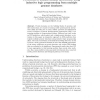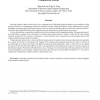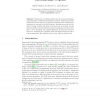1144 search results - page 53 / 229 » Logic programming for combinatorial problems |
LPNMR
2004
Springer
15 years 7 months ago
2004
Springer
Abstract. We consider the simplification of logic programs under the stablemodel semantics, with respect to the notions of strong and uniform equivalence between logic programs, r...
125
click to vote
DIS
2006
Springer
15 years 6 months ago
2006
Springer
Protein domains are the building blocks of proteins, and their interactions are crucial in forming stable protein-protein interactions (PPI) and take part in many cellular processe...
119
click to vote
PODS
1991
ACM
15 years 5 months ago
1991
ACM
A novel approach is proposed for ezpresaing and computing eficienily a large cla88 of problem8, including jinding the shortest path in a graph, that were previously considered imp...
151
click to vote
OPODIS
2003
15 years 3 months ago
2003
Detecting whether a finite execution trace (or a computation) of a distributed program satisfies a given predicate, called predicate detection, is a fundamental problem in distr...
109
click to vote
ERSHOV
1999
Springer
15 years 6 months ago
1999
Springer
Abstract. Monads are a technique widely used in functional programming languages to address many different problems. This paper presents extensions, a functional-logic programming...



